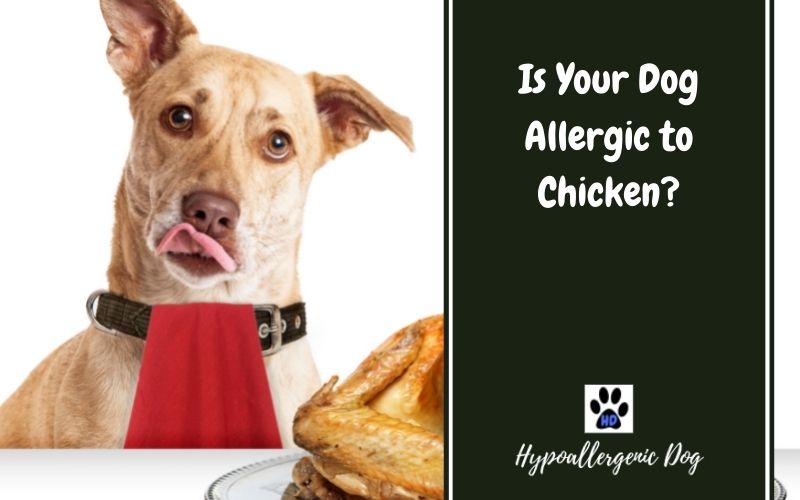Is My Dog Allergic to Chicken? The Symptoms
Chicken allergies are fairly common in dogs. Out of the main offenders, it’s in the top three. However, as it’s also one of the top doggy food staples, many pups could be suffering because their owners don’t know what to look for.
So, to answer, how do I know if my dog is allergic to chicken? Rest assured, I have your back. I’ve put together a list of the main symptoms and what you can do to fix the issue.
Symptoms of a Chicken Allergy in Dogs
If you think your dog is allergic to chicken, here are some of the signs and symptoms you should be on the lookout for.
Itching and Scratching
This is one of the most common symptoms of a chicken allergy in dogs. If your pup is furiously scratching parts of their body, it’s a clear indicator that something isn’t quite right.
The areas of irritation are typically concentrated around the rear end, ears, face, and feet. You might even spot them chewing their feet in a vain attempt to alleviate their discomfort.
However, scratching in this manner can also be the result of fleas, dermatitis, or other skin conditions.
Ear Inflammation
As a result of the continual scratching, your pet could develop sore, inflamed ears. They might appear very red or even hot to the touch. You may also notice a nasty smell coming from their ears as well as a brown waxy discharge — all sure signs that something isn’t right with your pup.
This is most likely going to require a visit to your vet as it can be a symptom of other ailments such as ear mites, an infection as well as an allergy.
Skin Injuries or Infections
Another sign of a dog allergy to chicken is a skin injury that won’t heal or an infection that doesn’t improve. You might have seen a superficial cut that’s taking longer to mend or a small wound that keeps becoming infected.
Hair loss is another possibility, it’s a knock-on effect from the incessant scratching.
Gastrointestinal Problems
If you notice that your pup’s tummy is a little more sensitive than usual, this may suggest that your dog is allergic to chicken. Vomiting or diarrhea could be a one-off episode, but keep a close eye on your pooch. If the condition persists, get in touch with your vet.
I Think My Dog is Allergic to Chicken — Now What?
To investigate the condition, your pet will be put onto a specific diet — eliminating chicken and any other foods they usually eat. Your pup will follow this food trial and be monitored for a period of time, determined by your vet.
If your pup manages this diet with no symptoms, the next step is to reintroduce chicken to your pooch’s meal plan. Should your pup have a reaction, it will confirm that chicken is to blame.
Your vet will be able to advise on specific foods to avoid for your pet’s allergy while also ensuring that they are receiving all the nutrients they need.
How to Avoid Developing an Allergy
There are things that you can do to prevent your best friend from developing allergies. Unfortunately for some dogs prone to allergies — due to their genetics — this can’t be prevented.
That said, for those not prone to hereditary allergies — varying your pet’s protein source is a great way to reduce the chances. For example, if your pup has enjoyed chowing down on a beef-based food this week, why not opt for salmon or trout as the base protein source in next week’s meal plan.
Alternative Protein Sources
Dog allergies to chicken can be a challenge for owners — it’s one of the most popular foods. Hence, you might need some inspiration for alternative protein sources to ensure your pooch’s diet remains healthy and balanced.
- Buffalo.
- Beef.
- Broccoli.
- Elk.
- Eggs.
- Whitefish.
- Lamb.
- Lentils.
- Quinoa.
- Rabbit.
- Salmon.
- Soybeans.
- Spinach.
- Venison.
Raw Diet
If you’re noticing that your pup is suffering from a lot of food-related allergies, you might consider trialing a raw food diet. Although there are associated risks with a raw diet and as it’s a controversial topic, discuss it with your vet before taking this road.
This typically consists of:
- Whole or ground bones.
- Organ meat, such as liver and kidneys.
- Raw eggs.
- Raw mince or meat on the bone.
- Cruciferous vegetables — like broccoli and Brussels sprouts.
Anecdotally reported benefits include healthier skin, cleaner teeth and shinier coats, higher energy levels, and smaller stools. So, if this is something you think your pup might benefit from, talk to your vet.
Conclusion
Additionally, it’s essential to vary your pup’s diet to reduce their chance of developing intolerances or allergies. Remember, a dog allergic to chicken, and the symptoms are common, but there are solutions. The most important thing is that your pup is happy and healthy!
Dog Chicken Allergies FAQs
“How Do You Know if Your Dog Is Allergic to Their Food?”
The most accurate way to diagnose a food allergy is an elimination diet. This will involve your dog eating a specific diet to determine whether they are reacting to any of the foods. Once they’ve been symptom-free, potential trigger foods will be slowly incorporated back into the diet to determine the offender. However, it’s important to consult your vet before you begin a diet like this, and it’s best to do so under their advice.
“Will Changing My Dog’s Diet Trigger a Food Allergy?”
If your dog is sensitive to a particular ingredient or food, suddenly incorporating this into their diet could trigger an allergic reaction. That said, there is no way to know whether or not your dog is allergic to an ingredient until they consume it.
“Can a Dog Suddenly Become Allergic to Chicken?”
When your dog consumes a certain food regularly, they could build up a tolerance to it — resulting in a food allergy. To avoid this happening, regularly switch up your pet’s food. This ensures that they experience a variety of ingredients and tastes while receiving adequate nutrients.
“My Dog Is Allergic to Chicken, Is Turkey Ok?”
Turkey is lean, white meat, similar to chicken, and highly digestible. Hence, pet foods with turkey as the protein base may be an ideal replacement for dogs who are allergic to chicken.
If you are wary of feeding your dog turkey, due to an existing poultry allergy, there are plenty of other options for protein — from broccoli and soybeans to meats like buffalo and rabbit.
“Is It Common For Dogs To Be Allergic to Chicken?”
It is extremely common for dogs to be allergic to chicken and in fact protein is one of the most common food allergens. Every time your dog consumes food with the allergen in it causes a reaction in their body and this produces the symptoms you may be seeing.
“What Do You Feed a Dog With a Chicken Allergy?”
For chicken allergies in dogs, you have to change the protein source in their food. However, when making changes to your dog’s diet you should continue to watch for any allergic symptoms to the newly introduced proteins.


